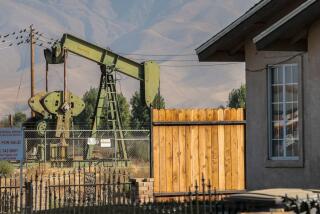Oil Official Urges Eased Restrictions on Industry
- Share via
A call for relaxation of environmental laws, an end to moratoriums on offshore oil drilling and more favorable tax treatment for oil and gas drillers was made Monday by an industry geologist at a meeting of scientists and petroleum engineers in Universal City.
G. Warfield Hobbs, a divisional president of the 30,000-member American Assn. of Petroleum Geologists, said it is high time the public and Congress recognize facts in the energy crisis.
“You can talk until you’re blue in the face,” Hobbs said. “They don’t want to hear it. . . . How do we get the public’s attention?”
Citing statistics provided by the U.S. Energy Information Agency, Hobbs told a joint luncheon of his group and the Geological Society of America that energy demand in the United States has grown by 20% since 1979, but domestic supply has increased by only 4.3%.
In the next 20 years, the agency’s projections show, overall energy consumption will increase by 32%, petroleum demand by 62%, natural gas demand by 45%, coal demand by 22% and electricity demand by 45%, Hobbs said.
“Despite a 37% increase in energy efficiency, crude oil imports will increase 40% by 2020 to a total 64% of domestic supply,” he said, even if curbs on domestic reduction are eased.
Suggestions for Increasing Production
Accordingly, Hobbs urged:
* Clearing the way for drilling off the East and West coasts and in the Gulf of Mexico, which he said could add 46 billion barrels of oil to the nation’s officially projected 110 billion in onshore reserves and 268 trillion cubic feet of gas to the projected onshore 1,074 trillion.
* Amending the Federal Antiquities Act to “prevent its misuse in restricting access to public lands.” The act protects some fossils and authorizes the president to set aside land for national monuments without going to Congress.
* Reforming the Clean Water Act and the Endangered Species Act, especially sections pertaining to wetlands. This would not lessen protections for “caribou and grizzly bears,” he said, but would “stop searches for the black-tailed ferret two counties from where it is known to exist,” and “stop protecting each separate subspecies of salamander.”
* Restricting the federal Environmental Protection Agency’s ability to regulate drilling muds as hazardous wastes. These have been implemented as additional protections from drilling excesses.
* Reducing taxes for the oil and gas industries by such changes as restoring the write-off of intangible drilling costs for passive investors, eliminating the “onerous alternative minimum tax” and raising depletion allowance provisions to previously high levels.
* Opening portions of the Arctic National Wildlife Refuge to oil drilling as President Bush has urged. Hobbs argued that most of the land to actually be used for drilling is swampland, not caribou grazing territory.
“We must assure the public that we have the energy resources to meet the demand and that these resources can indeed be developed in a responsible manner in environmentally sensitive areas of the Rocky Mountains, the north slope of Alaska, the eastern Gulf of Mexico and the Pacific and Atlantic outer continental shelf,” Hobbs said.
A resident of Connecticut, he said, “I frankly don’t want oil washing up on my family’s beach, but I’m prepared to take that risk to help resolve the nation’s energy problems.”
More to Read
Sign up for Essential California
The most important California stories and recommendations in your inbox every morning.
You may occasionally receive promotional content from the Los Angeles Times.













